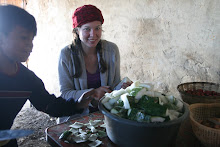Vigilante justice is the most common and to be truthful, probably the most effective, form of castigating criminals in Guatemala. Especially in very rural areas like mine, where there is not a police station for miles around, when someone steals, kills, rapes, extorts, kidnaps, cheats, etc, the community gets together and takes matters into their own hands. I have heard that there are a variety of Mayan punishments that get employed, like forcing the criminal to walk through town several times carrying large stones, but the only form I have ever heard of or seen in my area is a good old-fashioned lynching.
Yes, lynching. That's right, we're in 2009, here, folks.
The affair generally begins with the alleged criminal being seized from their home in the middle of the day. From there they are beaten, often with whips or rubber hoses. Then gasoline is poured on the offender and he is burned alive.
The most recent case of this happened in my little corner of the Land of the Eternal Spring about a month ago. Two young men were extorting a family for money in another town. When the police got wise, there was a shoot-out on main street, in which one innocent bystander died. The two men from my pueblo escaped unharmed and fled to a community in my town. Later that day, they met an untimely end at the hands of justice-seeking community leaders.
The general consensus of the people in my health center was a shrug followed by, "Pobrecitos, but they should have known better." As recently as last week, several men from within the health center were threatened by community leaders. As a result, they had to leave town.
Now, before you go dismissing an entire people as barbarians, I should remind you that lynching is not all that distant from many of our own communities. And unlike in many of the race and sexual orientation hate crimes in our nation's past, I would say that in most cases here in Guatemala, the criminals seem to be guilty the majority of the time.
Furthermore, lynchings here are rarely hate crimes. They are a form of seeking justice in a society where the murder conviction rate is in the single digits, and where security is everyone's top concern. Who can say that if a family member was brutally murdered, raped or even simply had all their possessions stolen from them, they would not be tempted to take matters into their own hands if the offender walked free? Of course, that begs the question of whether the vigilantes are really seeking justice or only vengeance, but that is another matter.
Many have speculated that after a thirty-year civil war, preceded by centuries of bloody clashes with the Spanish, what you have is a society that reaches for a gun to deal with its problems before all else. But with a corrupt government and a broken judicial system, who could blame them?
Better governance and less poverty are the only solutions to this problem.
